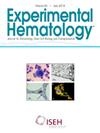Assessing the impact of cell isolation method on B cell gene expression using next-generation sequencing
IF 2.1
4区 医学
Q2 HEMATOLOGY
引用次数: 0
Abstract
Transcriptional profiling of peripheral blood mononuclear cells (PBMCs) is a widely explored research approach across multiple fields. Cell populations of interest are generally isolated before analysis, especially if low-frequency cell populations are desired. B cells, in particular, make up approximately 5%–10% of total PBMCs in healthy individuals, thus, isolation of B cell populations is crucial for researchers investigating B cell malignancies. The most widely used cell isolation methods include negative or positive magnetic cell sorting (MCS) and fluorescence-activated cell sorting (FACS). In contrast to negative MCS, it is widely believed that positive MCS and FACS may affect gene expression due to the direct interaction of cell selection antibodies with surface markers. To the best of our knowledge, no specific studies have examined these effects within CD19+ B cell populations. To evaluate this, we have performed RNA sequencing (RNA-seq) on B cells isolated from four healthy donors using three distinct methods: positive and negative MCS using the EasySep StemCell Technologies kits and FACS, performed using the MACSQuant Tyto sorter (Miltenyi Biotec). We report significant gene expression changes following CD19-dependent B cell isolation via either positive MCS or FACS relative to negative MCS, including a general upregulation of genes associated with immune activity and receptor signaling and downregulation of RNA processing genes. These results suggest that B cell isolation methods should be taken into consideration when designing experiments or incorporating publicly available sequencing datasets into ongoing research studies, as they may significantly impact the reliability and interpretability of the findings.
利用下一代测序技术评估细胞分离方法对B细胞基因表达的影响。
PBMCs的转录谱分析是一种被广泛探索的跨多个领域的研究方法。感兴趣的细胞群通常在分析之前分离,特别是如果需要低频细胞群。特别是B细胞,在健康个体中约占总pbmc的5-10%,因此,B细胞群的分离对于研究B细胞恶性肿瘤的研究人员至关重要。最广泛使用的细胞分离方法包括阴性或阳性磁细胞分选(MCS)和荧光激活细胞分选(FACS)。与MCS阴性相反,人们普遍认为MCS和FACS阳性可能由于细胞选择抗体与表面标记物的直接相互作用而影响基因表达。据我们所知,目前还没有专门的研究在CD19+ B细胞群中检测这些效应。为了评估这一点,我们使用三种不同的方法对n=4个健康供体分离的B细胞进行了rna测序:使用EasySep StemCell Technologies试剂盒和FACS进行阳性和阴性MCS,使用MACSQuant Tyto分选器(Miltenyi Biotec)进行。我们报告了cd19依赖性B细胞通过MCS阳性或FACS相对于MCS阴性分离后显著的基因表达变化,包括与免疫活性和受体信号相关的基因普遍上调以及RNA加工基因下调。这些结果表明,在设计实验或将公开可用的测序数据集纳入正在进行的研究时,应考虑B细胞分离方法,因为它们可能会显著影响研究结果的可靠性和可解释性。
本文章由计算机程序翻译,如有差异,请以英文原文为准。
求助全文
约1分钟内获得全文
求助全文
来源期刊

Experimental hematology
医学-血液学
CiteScore
5.30
自引率
0.00%
发文量
84
审稿时长
58 days
期刊介绍:
Experimental Hematology publishes new findings, methodologies, reviews and perspectives in all areas of hematology and immune cell formation on a monthly basis that may include Special Issues on particular topics of current interest. The overall goal is to report new insights into how normal blood cells are produced, how their production is normally regulated, mechanisms that contribute to hematological diseases and new approaches to their treatment. Specific topics may include relevant developmental and aging processes, stem cell biology, analyses of intrinsic and extrinsic regulatory mechanisms, in vitro behavior of primary cells, clonal tracking, molecular and omics analyses, metabolism, epigenetics, bioengineering approaches, studies in model organisms, novel clinical observations, transplantation biology and new therapeutic avenues.
 求助内容:
求助内容: 应助结果提醒方式:
应助结果提醒方式:


